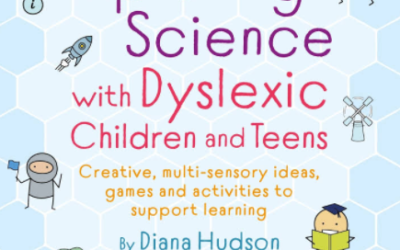Although many people may use the terms “concept map” and “mind map” interchangeably, mind maps tend to be simpler, relating information to a central topic, whereas concept maps seek to cover more complex subjects, relating different parts to each other. Concept maps can be used to simplify material because different information can be grouped together and in the making of the map it can be easier to see how new knowledge builds on old. The process of making a concept map also transforms learning into an active process and students who are strong personal and experiential learners may remember the process better than reading through notes again and again. For students who say that they get lost in class, doing a concept map can help […]
Hands-on Math and Games with Ronit Bird [Premium]
Recently, I discovered the math activities of Ronit Bird. Ronit Bird is the author of several books about Dyscalculia. She has helpful tips for parents and teachers about concrete manipulatives and building up a sense of number through activities more than worksheets. I confess, I wish I had had this more when I was a kid. The tricky thing about math and activities even if you’re home schooling or home-enriching is that students who are weak in an area will often not want to do it, even if it’s something that would be beneficial for them to do. In our family, we had one child who was very, very good at all types of speed-based computer games, and another who was decidedly not good […]
Cognitive Overload [Premium]
Here is a nice overview of cognitive load theory – the only downside is due to some ads, but that’s YouTube for you. Everyone is susceptible to cognitive overload, but overload increases with stress (pandemic anyone?), younger age, and dyslexia. Some people have small working memory capacities which may make them more prone to cognitive overload. As a group, dyslexics tend to be more susceptible to cognitive overload, meaning that they are more dependent on how information is taught. If you’re dyslexic yourself, it’s good to periodically do a productivity check. If you’re a college student, chances are you already know what it means to have memory overload. Students can prepare for tough subjects by reviewing in advance (finding a relevant video […]
Education Where Things Are Now & Looking Ahead To Fall Semester [Premium]
As expected, many students have experienced learning loss because of school changes related to the pandemic. As new cases fall and immunizations rise, school plans begin to take shape. Although some educational reports have tried to take a rosy picture of the pandemic’s effect on education, learning loss appears to be worldwide with the widest losses among lower socioeconomic groups, Blacks and Hispanics, and students with disabilities. The research firm McKinsey & Company found that learning loss during the pandemic average 6.8 months for K-12 students. In order to make up for losses, the report recommended at minimum 50 hours of targeted instruction over a two week period. Many states put waivers on dyslexia screening, teacher training, and intervention requirements due to […]
Tech Executive Justin Johnson [Premium]
“One of the things I love about startups is I get to engage the strategic thinking part of my brain across a broad set of things…” John Edgar introduced me to Justin from Macrometa and he shared his career and dyslexia story with me: “What I do now is, I work in a very early stage startup. So I do a lot of different things. Part of it’s visual, I manage user experience. With UX UI, or Developer Console, our company is kind of like cloud computing, like Amazon Web Services. We just have a little different play on it, where we do a lot of similar things to what Amazon does, we just do it all distributed across multiple locations, and we manage […]
Exploring Science With Dyslexic Children & Teens
"The book begins by describing the strengths and weaknesses of creative thinkers who have dyslexia. It outlines the reasons that they may struggle in science and gives examples of specific areas of the school science curriculum that are often very challenging for...
Why Many Dyslexics Thrive in Technology [Premium]
In every year that we’ve had our college scholarships program, technology majors have been among the winners. Dyslexic innovators are also often tech innovators themselves or innovators at the boundaries of technology and people. But why is this? There are many reasons, but certainly one central reason is that technology is a particularly adept at compensating for the greatest challenges that dyslexics face, while requiring the strengths that creative human problem solvers bring. The net result is a dyslexic innovator who can solve real human needs, while recognizing how they must leverage their own strengths. Thomas G. West, author of In the Mind’s Eye: Creative Visual Thinkers, Gifted Dyslexics, and the Rise of Technology, has lamented the fact that much of the education today […]
Steven Erickson LEGO Master Season Two!
Congratulations to Steven Erickson and his brother Mark who won a coveted spot on the second season of Lego Masters to compete for $100,000. Steven and his brother Mark have long been known to the LEGO community. You can find Steven HERE. I have...
Inspiration: Tech Executive John Edgar
As Chief Technology Evangelist and VP of Strategy at Digital Ocean, John Edgar helped grow the company from #1000 to #2 cloud provider in the world (second only to Amazon). How did he do it and how did he arrive at the top of his profession in technology, after...
Starting from the Positive Side of Dyslexia [Premium]
Last week I had a chance to talk with Aillie McKeever of the Schwab Learning Center at Stanford. In 2019, before COVID pandemic had fully taken hold here in the US, Stanford’s Schwab Center had decided to prioritize strengths in their approach to each and every student. They announced a “paradigm shift” to a strength’s based model of education. Every student would have a folder with a strengths section included in their assessment. Neurolearning shared its MIND Strengths Questionnaire with the center to examine the impact on students there. From Aillie: “In 2019, the MIND Strengths questions were included in this interview for every new student. Doing this seems to amplify students’ recognition of their strengths. As Learning Specialists leading the interviews, we noticed that […]
The Double Whammy: Dyscalculia and Dysgraphia [Premium]
What happens when a student has both dyscalculia and dysgraphia? Be prepared for an educational path that has a timing of its own. Dysgraphia often accompanies dyslexia, but dyscalculia too. If you or your student has two or three out of these 3 “d’s” be prepared for a challenging course and a need for individualization for many years. The most typical presentation for dyscalculia relates to students who have trouble mastering the sequence of numbers and recall of basic math facts. When dysgraphia gets added to the mix, you can imagine how it may swamp working memory, causing students to lose track when they work through math problems. In a very real sense having both dyscalculia and dysgraphia also robs students of being able to […]
Dyslexia and Bilingualism [Premium]
There are many bilingual or multilingual families who are also navigating a path through dyslexia. Bilingual students with dyslexia usually have similar problems in both languages, but some languages are “easier” to learn if the phonology and spelling are more predictable. So functionally, it is possible for a student to appear dyslexic in one language, but not so dyslexic in another. The focus of this article, is not whether a student should elect to learn a second language, and if so, when, but rather what challenges and potential benefits that bilingual dyslexic students do have to look forward to if they ultimately master two languages and also have their dyslexia remediated. LATER BLOOMING If dyslexic students as a group are considered late blooming in general […]

![Managing Information with Concept Maps [Premium]](https://www.dyslexicadvantage.org/wp-content/uploads/2021/07/Concept-Map-400x250.jpg)
![Hands-on Math and Games with Ronit Bird [Premium]](https://www.dyslexicadvantage.org/wp-content/uploads/2021/07/Math-Games-5-400x250.png)
![Cognitive Overload [Premium]](https://www.dyslexicadvantage.org/wp-content/uploads/2021/07/Screen-Shot-2021-07-05-at-1.57.07-PM.png)
![Education Where Things Are Now & Looking Ahead To Fall Semester [Premium]](https://www.dyslexicadvantage.org/wp-content/uploads/2016/05/Screen-Shot-2019-09-17-at-9.25.05-AM.jpg)
![Tech Executive Justin Johnson [Premium]](https://www.dyslexicadvantage.org/wp-content/uploads/2021/07/Justin-Johnson--327x250.png)

![Why Many Dyslexics Thrive in Technology [Premium]](https://www.dyslexicadvantage.org/wp-content/uploads/2021/06/Technology-Careers-400x250.png)


![Starting from the Positive Side of Dyslexia [Premium]](https://www.dyslexicadvantage.org/wp-content/uploads/2021/06/Starting-From-The-Positive-Side-Of-Dyslexia-400x250.png)
![The Double Whammy: Dyscalculia and Dysgraphia [Premium]](https://www.dyslexicadvantage.org/wp-content/uploads/2021/06/Dysgraphia-and-Dyscalculia-400x250.png)
![Dyslexia and Bilingualism [Premium]](https://www.dyslexicadvantage.org/wp-content/uploads/2021/06/Dyslexia-and-Bilingualism-400x250.png)













